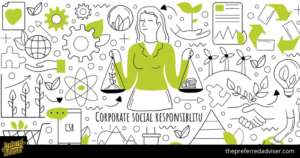By adding social responsibility initiatives, organizations can benefit in many ways, such as increased productivity, attracting top talent, and improving their reputation. Careful consideration is needed to choose the most appropriate initiatives though, as they can become costly.
What Is Social Responsibility?
Every individual has a responsibility to work with others and contribute to the world around them for the benefit of future generations. This is known as social responsibility.
There needs to be a balance between the economy and the ecosystem. Perhaps there is a trade-off between economic development and the welfare of society and the environment. Everyone’s actions that impact the environment need to be socially responsible.
Social Responsibility and Ethics
A company or individual that is considered socially irresponsible is not fulfilling their civic duty or taking actions that will benefit society as a whole. If a company or individual is considering taking actions that could harm the environment or society, then those actions would be considered socially irresponsible.
Ethics are a set of moral principles that govern a company’s or person’s behavior. It is important for companies to incorporate ethics into their daily actions, especially those decisions that affect other people or the environment.
The three standards that are generally upheld in order to maintain ethical social responsibility are as follows: behaving in an upstanding manner within the company, treating others with respect during interactions, and adhering to a set code of behavior.
Here are several examples:
- Aims to ensure secure healthcare for the people living in rural areas and eliminate barriers like distance, financial condition, etc.
- To help solve the ocean microplastics crisis, it will be required to keep the outdoors free of trash and litter, combining the resources of land managers, municipalities, non-profits, educational institutions, businesses, manufacturers, and individual volunteers.
- Be socially responsible passively, by avoiding engaging in socially harmful acts, or actively, by performing activities that advance social goals.
Future generations are affected by the actions of the current generation. Therefore, it is important to be socially responsible.
Advantages of Social Responsibility
1. Gives a company a competitive edge
Some customers and consumers today take into account a company’s social responsibility when making shopping or business decisions. This could include a company’s messaging around being socially responsible in its brand positioning and marketing. Customers and consumers like to buy from companies whose products and services reflect their needs, situation, practices, and culture.
2. Attracts strong candidates and increases retention
A company’s success is greatly influenced by its employees. If a company has a good reputation for being socially responsible, it can attract and keep good workers.
3. Makes your business attractive to investors
Committing to social change is generally seen as a good way to set a company up for long-term success by investors. While companies need to strike a balance between being profitable and undertaking social initiatives, doing both successfully can provide a lot of opportunities.
4. Increases customer loyalty and advocacy
People are more likely to buy products from companies that are known to be good corporate citizens. Additionally, customer advocacy is key to bringing in new customers. Your loyal customers talking to others about your product and sharing positive reviews will likely result in more business.
5. Improves company reputation
An organization that is continually participating in social initiatives creates an impression to customers, investors, and the world that it is financially viable. This, in turn, can attract new investors.
6. Improves profitability and value
When companies adopt energy-efficient methods and start recycling, they often find that their operational costs go down while they are helping the environment. In addition, social responsibility can make a company more transparent to investment analysts, shareholders, and community members, which can improve the company’s reputation and increase its overall value.
Examples of social responsibility in corporations
Here are a few examples of corporate social responsibility initiatives that companies have taken:
Companies are giving employees time off to volunteer every year and also donating revenue to charitable organizations.
Companies are finding ways to reduce their negative impact on the environment by holding tree-planting events, minimizing paper waste, switching to energy-saving bulbs, setting up recycling bins, and allowing remote work to reduce commuter traffic.
Brands are striving to improve working conditions and the well-being of employees by improving labor policies and embracing fair trade. They are giving parents significant periods of paid leave, unlimited vacation time, more natural lighting, soft seating, and plants to boost energy and morale.
Disadvantages Of Social Responsibility
While corporate social responsibility is generally advantageous for organizations, there are a few drawbacks. Here are the primary disadvantages that some critics argue to be distracting in the business economy:
1. Costs money to implement
While larger organizations can set aside a budget for corporate social responsibility reporting, this can be a financial burden on smaller organizations. They can use social media to share social responsibility policies or initiatives with customers and community members, even if monitoring these channels takes time and resources. Small businesses may need to hire extra employees to manage the process effectively. Even so, social media provides an opportunity to build relationships with customers and the community while promoting organizational transparency.
2. Impacts profitability
A company is expected to look out for its shareholders’ interests above all else. However, this can come into conflict with social responsibility initiatives, which can become costly. This can be a difficult balancing act for managers, who may feel like they have to choose between doing what is best for the company and making socially responsible decisions.
3. Greenwashing
Taking on social responsibility initiatives can be seen as a way to improve a company’s image, even if no other changes are made. It’s important to consider what initiatives you want to take on and evaluate how they will affect the organization.
Some people argue that businesses trying to be socially responsible are actually just trying to avoid being regulated by the government. However, the social responsibility of corporations can be independently verified by the entities procuring their goods and services.
For example, the Underwriters Laboratories environmental standards, BIFMA, BioPreferred, and Green Seal all provide verification tools. A corporation’s reputation for social responsibility is linked to higher profits, especially when the firm voluntarily reports both the positive and negative impacts of its social responsibility endeavors.
A reputation for social responsibility leads to consumers being more likely to want to buy products from a company that has helped others. This is especially true for consumers who place a high value on helping others. If consumers think a company’s motives are not pure, this effect is reduced.
When looking at corporate social responsibility (CSR) through the lens of ethics and accountability, we can see that companies have a duty to uphold certain standards in order to be considered socially responsible. This duty may be to the employees, customers, shareholders, or society at large. Through accountability, companies can be held to these standards and be required to make changes if they are not met.
Scientists and Engineers Under the Spotlight
Looking now at one important sector, in particular, Scientists and Engineers should be held responsible for the negative consequences of their inventions as they are for the positive consequences. If they take pride in the achievements of science and technology, they should also accept responsibility for the negative consequences related to the use or abuse of scientific knowledge and technological innovations. Scientists and engineers have a collective responsibility to examine the values embedded in the research problems they choose and the ethics of how they share their findings with the public.
Committees of scientists and engineers often help plan research programs for the government or private companies, which can include developing military technologies and weaponry. Many professional societies and national organizations, such as the National Academy of Sciences and the National Academy of Engineering in the United States, have ethical guidelines (see Engineering ethics and Research ethics) for how scientific research and engineering should be conducted. Scientists and engineers have a special responsibility to use their knowledge ethically and for the benefit of society, which is greater than the responsibility of regular citizens.
Who Is Directly Accountable?
Some argue that because of the complexity of social responsibility in research, scientists and engineers should not be blamed for all the evils created by new scientific knowledge and technological innovations. Here are a few reasons:
Fragmentation and Diffusion of responsibility
The way work is divided up, and decisions are made within corporations and government research laboratories makes it very hard for individual scientists and engineers to control how their innovations are used. This fragmentation of responsibility often means that “everyone involved was responsible, but no one could be held responsible.”
Ignorance
The scientists and engineers cannot predict how the new knowledge and technology they create may be used to harm others.
The excuse of ignorance is stronger for scientists involved in very basic and fundamental research where potential applications cannot even be envisioned than for scientists and engineers involved in applied scientific research and technological innovation.
Most research that is funded by government agencies is focused on specific goals, such as protecting the environment, developing new drugs, or designing more lethal weapons. In cases where the application of scientific knowledge and technological innovation is already known to be morally questionable, scientists and engineers cannot simply excuse themselves by claiming ignorance.
The funder of the research and technological developments is responsible for ensuring that the research and developments are accountable.
Most of the time, the people who pay for research and technological developments are responsible for what happens with them (usually corporations and government agencies). Because taxpayers pay for government-sponsored research, they and the politicians that represent them should be held accountable for the good and bad things that happen with science. In the past, scientists could often do research by themselves, but today’s experimental research usually requires expensive laboratories and equipment, so scientists are now dependent on the people who pay for their studies.
Scientists, businessmen, and politicians can prevent costly intervention in those businesses by government agencies by making ethical decisions. For example, if a company follows the United States Environmental Protection Agency (EPA) guidelines for emissions of dangerous pollutants and goes further to involve the community and address concerns the public might have, the EPA might be less likely to investigate them for environmental concerns. Some experts say that most rules and regulations are formed due to public outcry, which threatens profit maximization and, therefore, the well-being of shareholders; if there is no outcry, there often will be limited regulation.
Looking ahead, the concept of quasi-legal instruments, or soft law, has received some traction as a norm in relation to private and public corporations in the UNESCO Universal Declaration on Bioethics and Human Rights, developed by the UNESCO International Bioethics Committee. This is particularly true in relation to child and maternal welfare. The International Organization for Standardization will “encourage voluntary commitment to social responsibility and will lead to common guidance on concepts, definitions, and methods of evaluation.



0 comments